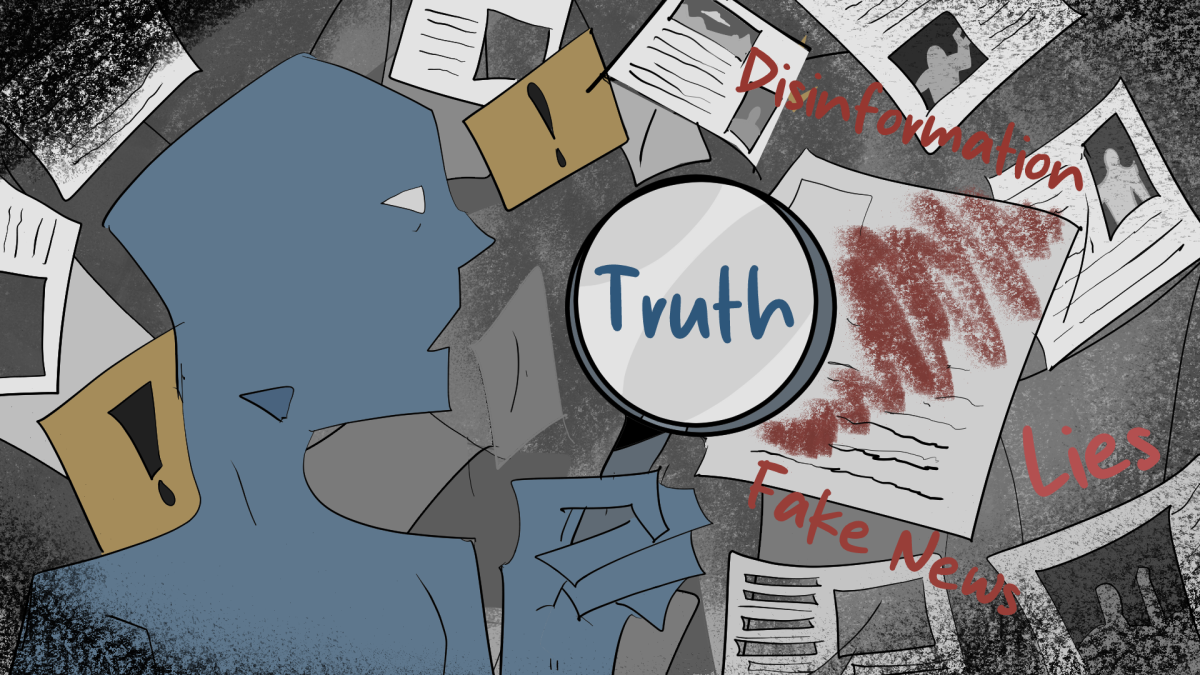As the 2024 election approaches, social media platforms are flooded with information, making it challenging for voters to discern legitimate news from misinformation.
Over half of U.S. adults get their news through social media. Paul Isom, senior lecturer in the English department and advisor in the journalism minor, said misinformation is more prevalent on social media due to a lack of control.
“I think that’s usually where that happens, where there aren’t any controls, there aren’t any editors, there’s nobody saying, ‘Wait a minute, we can’t publish this,’ because it’s one or two people making a decision and putting out there for many people to read,” Isom said.
Despite widespread use of social media for news, 67% of U.S. adults are concerned about misinformation spreading on these platforms. For Christa Gala, senior lecturer in the English department and its journalism minor, there’s good reason for this concern.
“A majority of Americans are getting their news off social media platforms or digital websites that are even backed by Russia or Iran or China,” Gala said. “We’re really looking at major threats to democracy, and we’re seeing that really clearly in the U.S. government trying to shut down some of these Russian-influenced sites that were fronted as American social media influencers, but what they really were was propaganda from other governments.”
Trust in official news networks is at an all-time low, and despite a notable drop in trust around the 2016 election, Isom said this lack of trust isn’t a new concept.
“It’s the idea of, if you don’t like the message, kill the messenger,” Isom said. “… It’s your own vested interest, so you don’t want any negative coverage of this person whom you’ve decided you support. That’s always been the case.”
Isom said this distrust and flood of information ramps up during elections.
“Now that we’re so close to an election, there is a lot of information,” Isom said. “There are a lot of people really invested in swaying people, and there’s a lot of money involved, obviously, because so many people are giving money or are funding mouthpieces, including the candidates themselves, in some cases.”
With so much distrust and misinformation, news can feel difficult to access but media literacy creates opportunities for students to confirm what they’re reading is real.
Gala said in her experience, learning media literacy can be fun for students.
“I mean, in a way, it’s sort of like sleuthing,” Gala said. “… It’s cool, and it makes students feel empowered. And it’s also fun, because they’re not just trying to listen and take notes, they’re looking at things that are out there and saying, ‘Well, which one is the fake one, and how can I tell?’”
Gala said official news networks have tried combating this issue, especially during elections, by proving facts they’re reporting on.
“One thing that we hope to start seeing is that we’ll have fact checkers running alongside concurrent with debates,” Gala said. “Right now, we’re putting the burden on the viewer or the listener to go in and fact check. The fact checks are there, but they have to take the extra time to do it and people are just busy or uninterested. So having that fact checker running along simultaneously will really help.”
Steven Greene, a professor in the political science department, said news outlets that fact-check themselves make the difference between a reliable and unreliable source.
“Any news organization that reliably issues corrections is a news organization you want to trust,” Greene said. “… People have these ideas out there about mainstream news sources, that they themselves are misinformation. These major national media organizations are in the business of trying to get it right. Sometimes they get it wrong, and when they do, they will tend to correct.”
Alongside official fact checks and corrections issued by news organizations, students can fact-check for themselves. Isom said certain fact-checking websites like PolitiFact are useful in determining whether political ads are true or false.
Greene said checking whether information appears in more than one story is also a good way to determine whether a story is true or false.
In addition to paying attention to the general election, Greene said students often overlook local elections.
“What happens here in North Carolina, what happens in Raleigh, what happens in Wake County, have a huge impact on our lives,” Greene said. “And people should not ignore this. You know, my guess is most of my students can’t even name the Raleigh mayor and that’s not good.”
In order to learn more about local elections, Greene said local outlets such as News and Observer are informative.
NC State also offers students access to newspapers such as the New York Times. Students can access these publications through the NC State Library.
Gala said students have a responsibility to remain informed.
“When we’re in higher education, I feel like we have a responsibility to be intelligent citizens of the world,” Gala said. “Expose yourself to different publications and platforms, and really look and be discerning, but understand that some publications are legitimate and some are illegitimate. … We can choose what we want to read and what we believe, but we can’t say, ‘this set of untrue facts is actually real.’”













